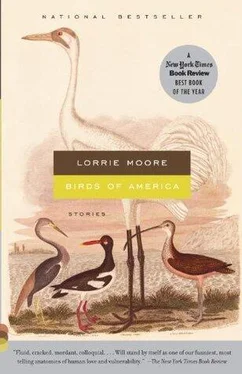That night, postop night, the Mother and Husband lie afloat in the cot together. A fluorescent lamp near the crib is kept on in the dark. The Baby breathes evenly but thinly in his drugged sleep. The morphine in its first flooding doses apparently makes him feel as if he were falling backward — or so the Mother has been told — and it causes the Baby to jerk, to catch himself over and over, as if he were being dropped from a tree. “Is this right? Isn’t there something that should be done?” The nurses come in hourly, different ones — the night shifts seem strangely short and frequent. If the Baby stirs or frets, the nurses give him more morphine through the Hickman catheter, then leave to tend to other patients. The Mother rises to check on him in the low light. There is gurgling from the clear plastic suction tube coming out of his mouth. Brownish clumps have collected in the tube. What is going on? The Mother rings for the nurse. Is it Renée or Sarah or Darcy? She’s forgotten.
“What, what is it?” murmurs the Husband, waking up.
“Something is wrong,” says the Mother. “It looks like blood in his N-G tube.”
“What?” The Husband gets out of bed. He, too, is wearing sweatpants.
The nurse — Valerie — pushes open the heavy door to the room and enters quietly. “Everything okay?”
“There’s something wrong here. The tube is sucking blood out of his stomach. It looks like it may have perforated his stomach and that now he’s bleeding internally. Look!”
Valerie is a saint, but her voice is the standard hospital saint voice: an infuriating, pharmaceutical calm. It says, Everything is normal here. Death is normal. Pain is normal. Nothing is abnormal. So there is nothing to get excited about. “Well now, let’s see.” She holds up the plastic tube and tries to see inside it. “Hmmm,” she says. “I’ll call the attending physician.”
Because this is a research and teaching hospital, all the regular doctors are at home sleeping in their Mission-style beds. Tonight, as is apparently the case every weekend night, the attending physician is a medical student. He looks fifteen. The authority he attempts to convey, he cannot remotely inhabit. He is not even in the same building with it. He shakes everyone’s hands, then strokes his chin, a gesture no doubt gleaned from some piece of dinner theater his parents took him to once. As if there were an actual beard on that chin! As if beard growth on that chin were even possible! Our Town! Kiss Me Kate! Barefoot in the Park! He is attempting to convince, if not to impress.
“We’re in trouble,” the Mother whispers to the Husband. She is tired, tired of young people grubbing for grades. “We’ve got Dr. ‘Kiss Me Kate,’ here.”
The Husband looks at her blankly, a mix of disorientation and divorce.
The medical student holds the tubing in his hands. “I don’t really see anything,” he says.
He flunks! “You don’t?” The Mother shoves her way in, holds the clear tubing in both hands. “That,” she says. “Right here and here.” Just this past semester, she said to one of her own students, “If you don’t see how this essay is better than that one, then I want you just to go out into the hallway and stand there until you do.” Is it important to keep one’s voice down? The Baby stays asleep. He is drugged and dreaming, far away.
“Hmmm,” says the medical student. “Perhaps there’s a little irritation in the stomach.”
“A little irritation?” The Mother grows furious. “This is blood. These are clumps and clots. This stupid thing is sucking the life right out of him!” Life! She is starting to cry.
They turn off the suction and bring in antacids, which they feed into the Baby through the tube. Then they turn the suction on again. This time on low.
“What was it on before?” asks the Husband.
“High,” says Valerie. “Doctor’s orders, though I don’t know why. I don’t know why these doctors do a lot of the things they do.”
“Maybe they’re … not all that bright?” suggests the Mother. She is feeling relief and rage simultaneously: there is a feeling of prayer and litigation in the air. Yet essentially, she is grateful. Isn’t she? She thinks she is. And still, and still: look at all the things you have to do to protect a child, a hospital merely an intensification of life’s cruel obstacle course.
The Surgeon comes to visit on Saturday morning. He steps in and nods at the Baby, who is awake but glazed from the morphine, his eyes two dark unseeing grapes. “The boy looks fine,” the Surgeon announces. He peeks under the Baby’s bandage. “The stitches look good,” he says. The Baby’s abdomen is stitched all the way across like a baseball. “And the other kidney, when we looked at it yesterday face-to-face, looked fine. We’ll try to wean him off the morphine a little, and see how he’s doing on Monday.” He clears his throat. “And now,” he says, looking about the room at the nurses and medical students, “I would like to speak with the Mother, alone.”
The Mother’s heart gives a jolt. “Me?”
“Yes,” he says, motioning, then turning.
She gets up and steps out into the empty hallway with him, closing the door behind her. What can this be about? She hears the Baby fretting a little in his crib. Her brain fills with pain and alarm. Her voice comes out as a hoarse whisper. “Is there something—”
“There is a particular thing I need from you,” says the Surgeon, turning and standing there very seriously.
“Yes?” Her heart is pounding. She does not feel resilient enough for any more bad news.
“I need to ask a favor.”
“Certainly,” she says, attempting very hard to summon the strength and courage for this occasion, whatever it is; her throat has tightened to a fist.
From inside his white coat, the surgeon removes a thin paperback book and thrusts it toward her. “Will you sign my copy of your novel?”
The Mother looks down and sees that it is indeed a copy of a novel she has written, one about teenaged girls.
She looks up. A big, spirited grin is cutting across his face. “I read this last summer,” he says, “and I still remember parts of it! Those girls got into such trouble!”
Of all the surreal moments of the last few days, this, she thinks, might be the most so.
“Okay,” she says, and the Surgeon merrily hands her a pen.
“You can just write ‘To Dr. — Oh, I don’t need to tell you what to write.”
The Mother sits down on a bench and shakes ink into the pen. A sigh of relief washes over and out of her. Oh, the pleasure of a sigh of relief, like the finest moments of love; has anyone properly sung the praises of sighs of relief? She opens the book to the title page. She breathes deeply. What is he doing reading novels about teenaged girls, anyway? And why didn’t he buy the hardcover? She inscribes something grateful and true, then hands the book back to him.
“Is he going to be okay?”
“The boy? The boy is going to be fine,” he says, then taps her stiffly on the shoulder. “Now you take care. It’s Saturday. Drink a little wine.”
· · ·
Over the weekend, while the Baby sleeps, the Mother and Husband sit together in the Tiny Tim Lounge. The Husband is restless and makes cafeteria and sundry runs, running errands for everyone. In his absence, the other parents regale her further with their sagas. Pediatric cancer and chemo stories: the children’s amputations, blood poisoning, teeth flaking like shale, the learning delays and disabilities caused by chemo frying the young, budding brain. But strangely optimistic codas are tacked on — endings as stiff and loopy as carpenter’s lace, crisp and empty as lettuce, reticulate as a net — ah, words. “After all that business with the tutor, he’s better now, and fitted with new incisors by my wife’s cousin’s husband, who did dental school in two and a half years, if you can believe that. We hope for the best. We take things as they come. Life is hard.”
Читать дальше












